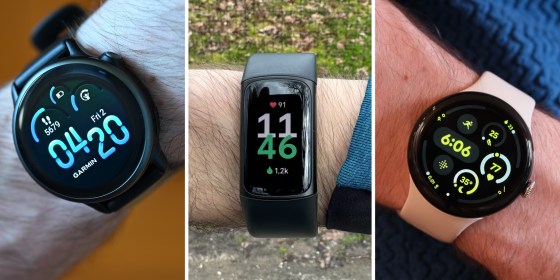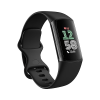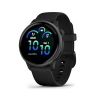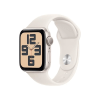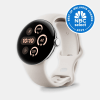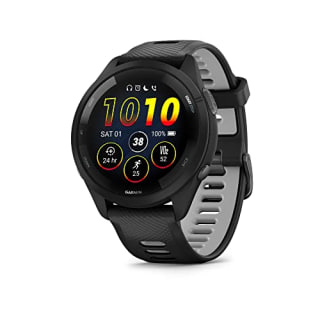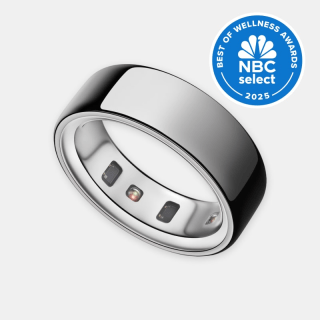Whether you are training for a marathon or working out for the first time in months, a fitness tracker can show you health and exercise data that can help you better understand your efforts. Most have heart rate, GPS and activity tracking built-in, and many can provide insights into your sleep and recovery. I’ve tested over a dozen fitness trackers and spoke with health and training experts to pick the best ones on the market.
How I picked the best fitness trackers
I spoke with health and fitness experts to better understand how fitness watches, bands and rings can support your exercise and wellness journey. Based on their advice, I kept the following criteria in mind while selecting and testing different models:
- Comfort and wearability: A fitness tracker is only useful if you wear it, says Dr. Koyya Lewis-Trammell, associate professor of kinesiology and health promotion at California State Polytechnic University, Pomona. It can have the most advanced tools on the market, but those features are meaningless if you don’t wear it regularly.
- Compatibility: Not every phone is compatible with every fitness tracker — the Apple Watch only works on iPhone, for example. We include options that are compatible with both iOS and Android devices, so you can find a suitable option.
- Data tracking: Fitness trackers collect different kinds of biometric data and present it in different ways. We chose products that collect a range of fitness insights. Some show basic metrics like steps and heart rate, while others display more complex analysis of your workouts and efforts.
How I test fitness trackers
I’ve tested over a dozen fitness trackers and smartwatches for NBC Select. I am a runner and cyclist, and use fitness trackers to monitor my pace, heart rate and distance. I test each one for at least two weeks, using all of the features available, including sleep tracking. I often wear multiple fitness trackers at the same time to compare data like heart rate, average pace, mileage, elevation and sleep score.
To pick the best fitness trackers, I paid close attention to the following factors:
- GPS tracking: I noted how quickly each tracker connected to GPS and how consistent the data was, especially compared to other trackers.
- Comfort: I wore each tracker day and night to see if they became uncomfortable, disrupted my sleep or irritated my skin.
- Features: I tested as many features as possible but focused on fitness and wellness tracking tools and stats.
Want more from NBC Select? Sign up for our newsletter, The Selection, and shop smarter.
The best fitness trackers of 2025
Our top picks come from well-known brands like Fitbit, Apple and Garmin. I have tested each one, and some also come recommended by experts in the health and fitness space.
In an effort to try as many options as possible, we contacted and received products from many brands, including (but not limited to) the ones on this list.
Best for beginners
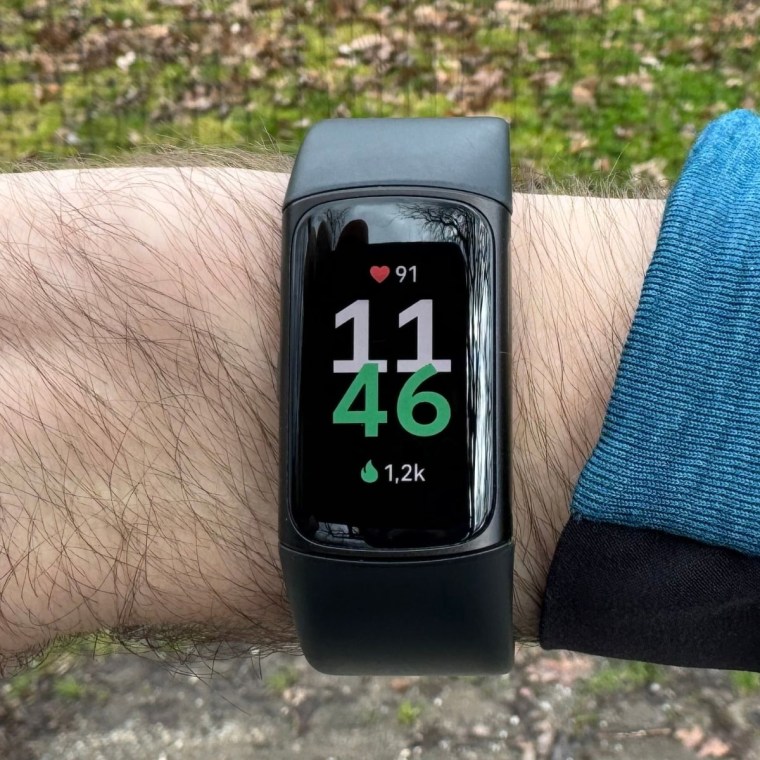
Many NBC Select staffers use Fitbit fitness trackers and love them because they are lightweight and easy to use. The Charge 6 is just that: a small, beginner-friendly fitness tracker that’s light on weight and light on price.
Despite having rarely used Fitbit products in the past, the Charge 6 felt comfortable after only a few minutes of swiping through the watch and app. The screen and stats are bright, colorful and easy to understand.
The Charge 6 tracks and showcases your heart rate, daily steps, distance traveled, fitness activities, calories burned and nightly sleep. It does not track more advanced running stats like cadence, stride length, ground contact time and vertical oscillation (our picks from Apple and Garmin do). Some data like detailed sleep stages and a daily readiness score are only available with a Fitbit Premium subscription, which costs $10 per month.
New to the Charge 6 is Google Wallet, Google Maps navigation and YouTube Music controls. It also now has a button on the left side that returns you to the home screen or pause workout screen. You can read more in our Fitbit Charge 6 review.
Best overall
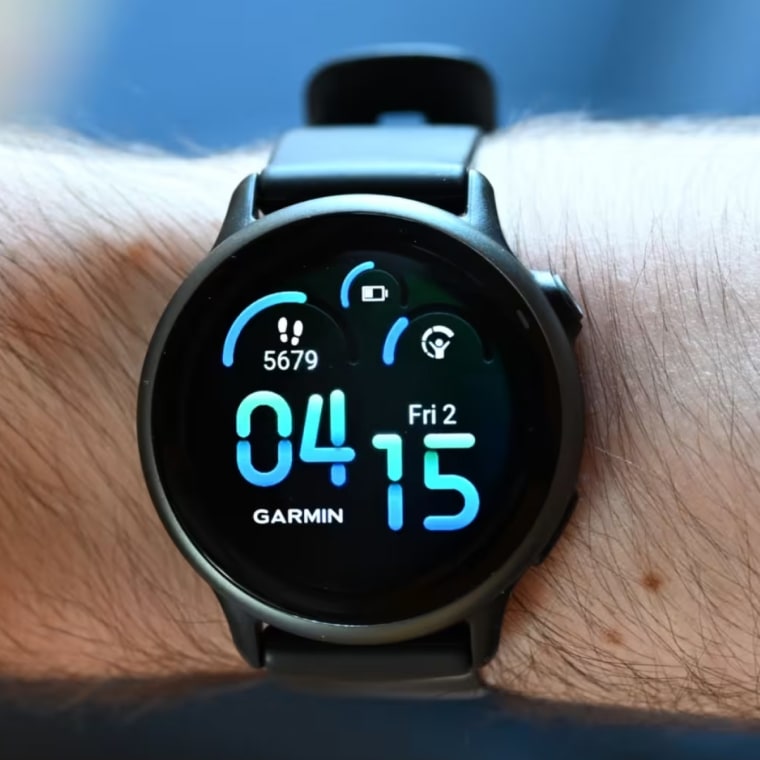
The Garmin Vivoactive 6 hits just the right balance with robust fitness features, smartwatch capabilities, long battery life and a reasonable price all packed within a subtle design. I was constantly surprised by how many and how rich its features were, especially considering this is one of Garmin’s most affordable watches.
It tracks your health, sleep and fitness activity — with in-depth metrics and analysis for all three. Fitness is particularly impressive, with features like Body Battery, workout recovery times, Garmin Pace Pro and Garmin Coach (with running and strength training plans).
One standout feature I love is workout animation — the watch will play short videos of a silhouette performing certain exercises. This is mostly when doing Garmin Connect workouts (think HIIT, cardio, strength and yoga), but where I find this the most fun is for Move Alerts — the watch will remind me to move, give me a few movement options to choose from, then play an animation of that movement to follow. It made taking breaks at my desk a lot more fun.
The Garmin Connect app is less intuitive than apps from competitors like Fitbit and Apple — give yourself time to get used to it before dismissing it outright.
Best for iPhone
The Apple Watch is one fitness tracker that almost always stays on my wrist, and this is the brand’s lowest-priced model. It costs much less than the Apple Watch Series 10 and Apple Watch Ultra 2, but has almost all the same fitness tracking features and metrics.
The Apple Watch SE is easy to use, especially if you have used an iPhone before. The apps are similar or identical, and the square shape of the watch makes it easy to scroll through notifications and texts. It shows detailed workout, health and sleep metrics via the Apple Health and Apple Fitness, no subscription required. You can also use the Siri voice assistant to make requests and send voice texts, which is much easier than typing a text mid-run, in my experience.
The watch has up to 18 hours of battery life, according to the brand — that’s less than most competitors. To avoid battery life woes, I typically charge it every morning after waking up. It comes in two sizes, 40mm and 44mm, with many watch band options.
Best for Android
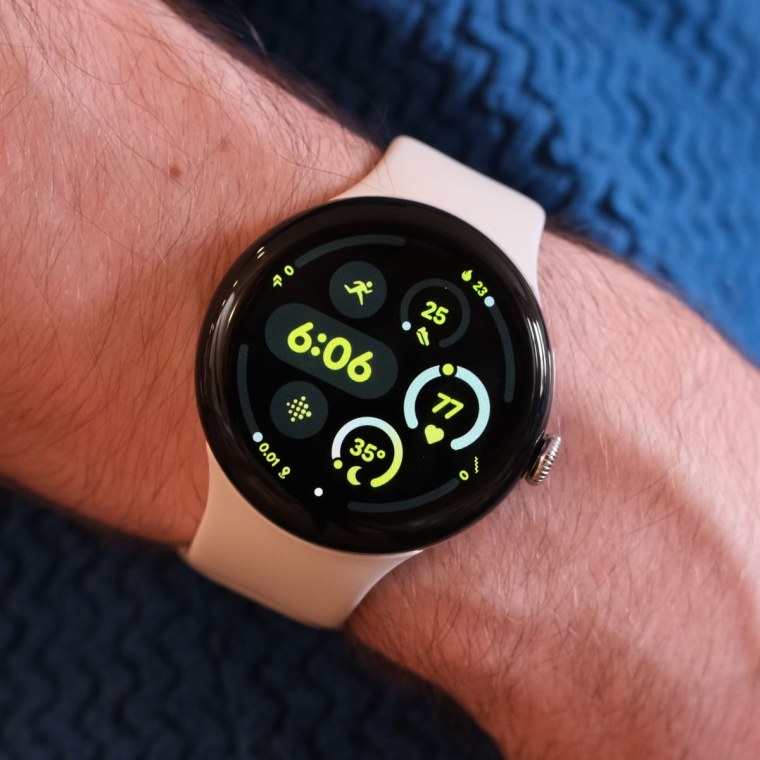
The Pixel Watch 3 is the best Pixel watch yet, and is a recent NBC Select Wellness Awards winner. It has major software and fitness improvements over the previous model that make it a solid option, especially for someone with an Android or Google Pixel phone.
It does everything you would expect of all the best smartwatches: notifications, texting, calls, tap-to-pay, media controls, offline maps and more.
The watch has built-in Fitbit fitness tracking with more than 40 workout types, and it has more in-depth fitness tracking data compared to other Fitbit products like the Fitbit Charge 6. It can also automatically detect walks, runs, bike rides, treadmill, elliptical, rowing and spin exercise after five minutes (15 for walking). As someone who often forgets to log walks, I love how hands-off this feature can be.
But the new fitness and wellness features are what makes the Google Pixel Watch 3 one of our top picks. There are too many features to list here, but one of my favorites is building custom workouts, including custom runs with warm ups, cool downs, intervals and heart rate targets. As I ran, the watch buzzed and cued me into my next section and indicated if I was on, ahead or behind my target goals. Other favorite features include cardio load and daily readiness scores.
It comes in two sizes, 41 millimeters and 45 millimeters, with screens that are up to twice as bright as the previous version. Battery life is also improved — it lasts up to 24 hours, according to the brand.
Best for runners
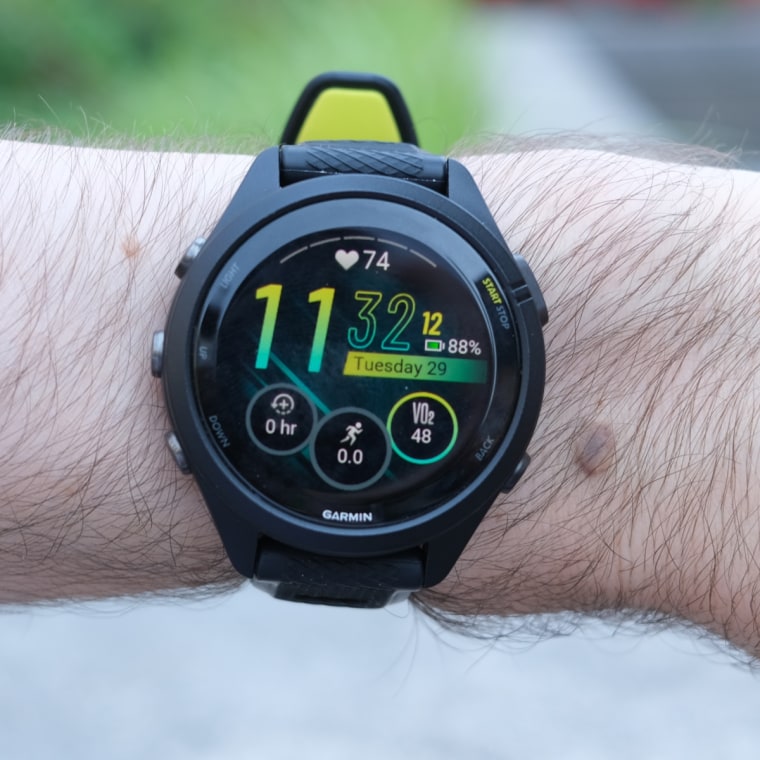
The Garmin Vivoactive 6 is more than enough for most fitness activities, but people training for a race, marathon or triathlon will appreciate what the Forerunner 265 has to offer. It’s a running watch with a few key features that set it apart from my other top picks.
The most important are Training Readiness, Training Status and HRV (heart rate variability) Status, which work in tandem to help optimize your training and recovery.
Training Readiness combines multiple metrics to give you a top-level score about how beneficial training is today. In practice, it helped me decide whether the day was a rest day, easy day or day to push myself.
The watch, of course, also has advanced running metrics like power, cadence, stride length and ground contact time, as well as multi-band GPS for the most accurate, consistent outdoor data possible.
Like most Garmin watches, the Forerunner 265 has excellent battery life — I averaged about 10 days before needing to charge. It also connects to GPS quickly, usually within five seconds.
The Forerunner 265 is pricey though. If price is more important to you than features like dual-band GPS, Training Load and Training Readiness, the aforementioned Garmin Vivoactive 6 or make for great, cheaper alternatives.
Best smart ring
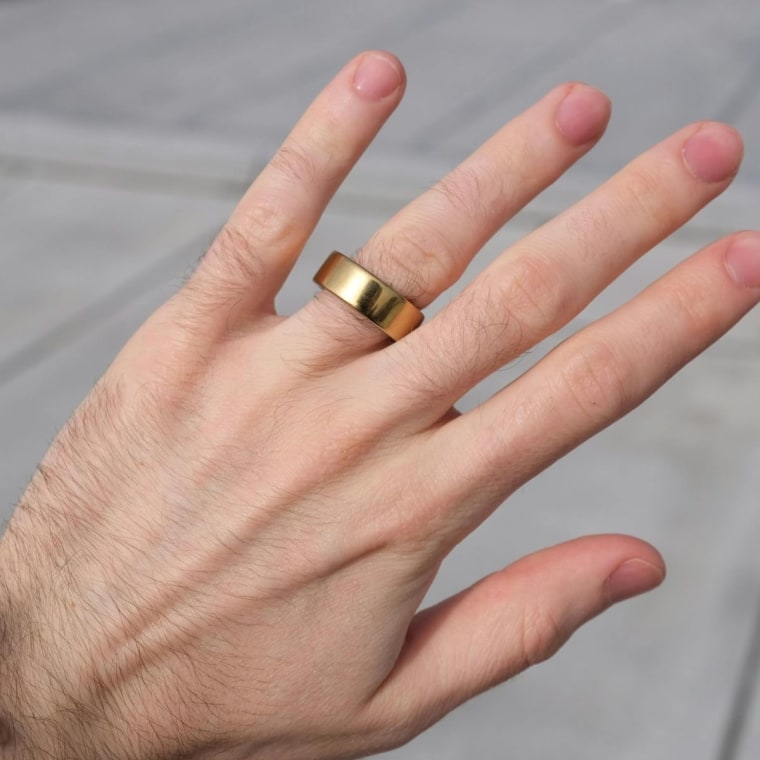
If you want to track health, wellness, sleep and basic fitness stats, but hate wearing watches, consider a smart ring like the Oura Ring 4. I tested it for over two months — it’s one of the best smart rings on the market right now, especially for sleep and wellness tracking.
The Oura Ring 4 tracks stats like heart rate, body temperature, blood oxygen, sleep stages, stress levels and exercise metrics and stores them on the Oura app. It automatically tracks walks as well, but it’s best to manually start and stop other exercises like runs, yoga and strength training. It categorizes and gives you broad scores for three main categories: readiness, sleep, and activity.
Because it doesn’t have a screen, it cannot show live stats like pace, distance or heart rate zones, meaning it’s not a great fit for avid runners or cyclists
The Oura Ring comes in six colors and a range of sizes. While you can use the Oura Ring without a subscription, you’ll be limited to the current day’s sleep, readiness and activity scores. An Oura Ring membership costs $6 a month. You can learn more in my Oura Ring 4 review.
How to shop for a fitness tracker
When shopping for any fitness tracker, price and compatibility should be top of mind. But beyond that, our experts recommend prioritizing the following:
Prioritize comfort
Both Lewis-Trammell and Athayde say that comfort and wearability are the most important factors of any fitness tracker.
If you don’t ever wear rings, you probably won’t find the Oura Ring comfortable. Similarly, if you don’t like to wear a watch, a smartwatch like the Apple Watch or Google Pixel Watch might be uncomfortable. “Ultimately, you’re looking for a device you’re going to wear long term so that it can provide you with the most accurate data,” says Athayde.
Because trackers come in so many shapes and sizes, I recommend going to a store in-person to try a few different options and see what form-factor makes sense for you. Having tested over a dozen options, I am surprised how different each model feels, even ones with similar wristbands.
Identify your goals and needs
It’s not just athletes that benefit from fitness trackers, says Athayde. Everyone can benefit from the data fitness trackers provide, if you understand your wants and needs, in my experience.
Before shopping around, think about what data you care about. If you love outdoor exercise stats like pace and power, a Garmin watch may match your habits best. If you want broad exercise and health data, plus all the latest apps, a smartwatch from Apple or Google is a good fit.
What’s best for you depends on your daily habits and larger goals, according to our experts. Take stock of them before you checkout.
Meet our experts
At NBC Select, we work with experts who have specialized knowledge and authority based on relevant training and/or experience. We also take steps to ensure all expert advice and recommendations are made independently and without undisclosed financial conflicts of interest.
- Dr. Koyya Lewis-Trammell is an associate professor of kinesiology and health promotion at California State Polytechnic University, Pomona.
- Rhys Athayde is a celebrity personal trainer and the former co-owner and director of fitness and operations at Ghost Williamsburg.
Why trust NBC Select?
I am a reporter at NBC Select who covers technology and fitness including recent stories on running shoes, workout earbuds, point-and-shoot cameras and more. For this piece, I interviewed fitness and health experts to get a better understanding of workout data and metrics. I also tested over a dozen top-rated fitness trackers, smartwatches and smart rings. For a broader perspective, I spoke with other NBC Select staffers about their experience using fitness trackers.
Catch up on NBC Select’s in-depth coverage of tech and tools, wellness and more, and follow us on Facebook, Instagram, Twitter and TikTok to stay up to date.
